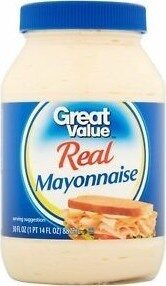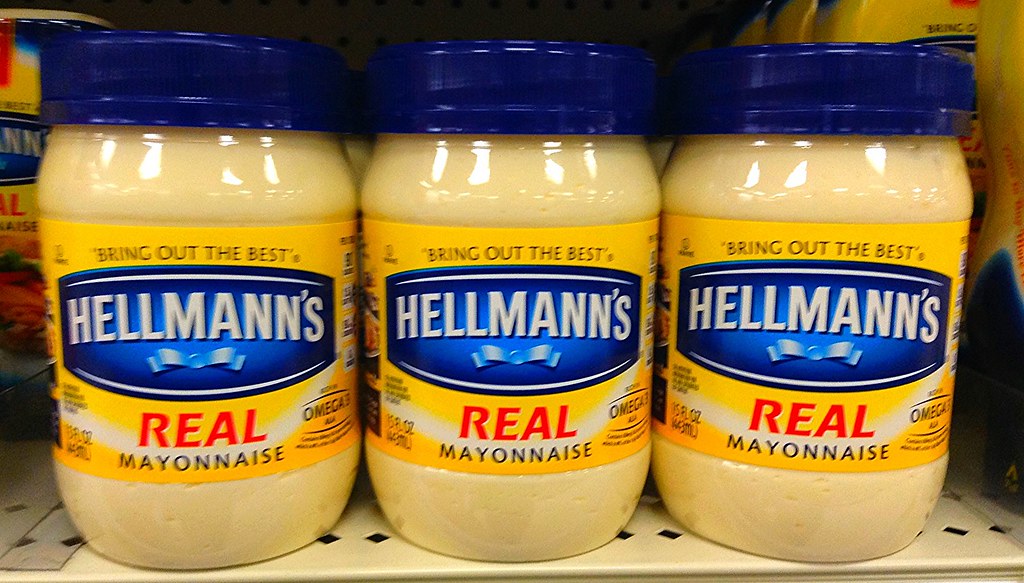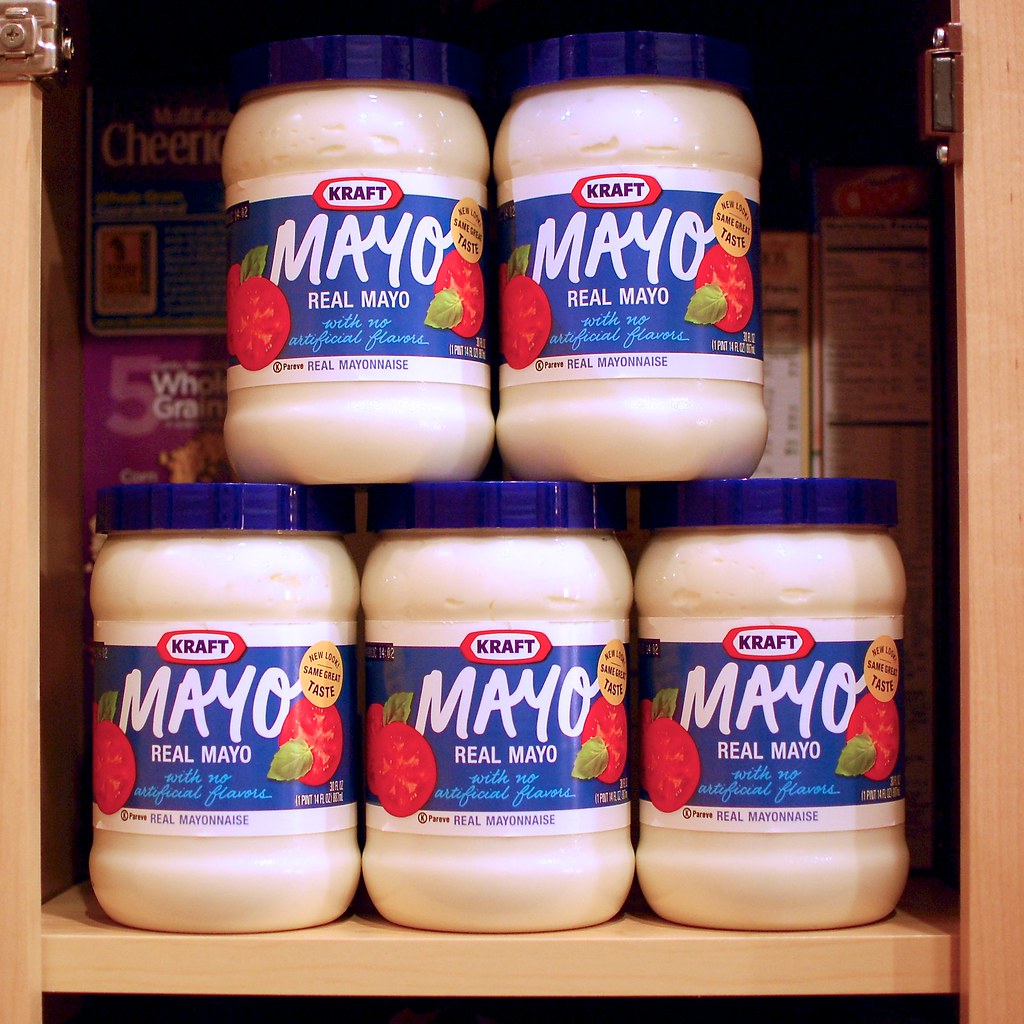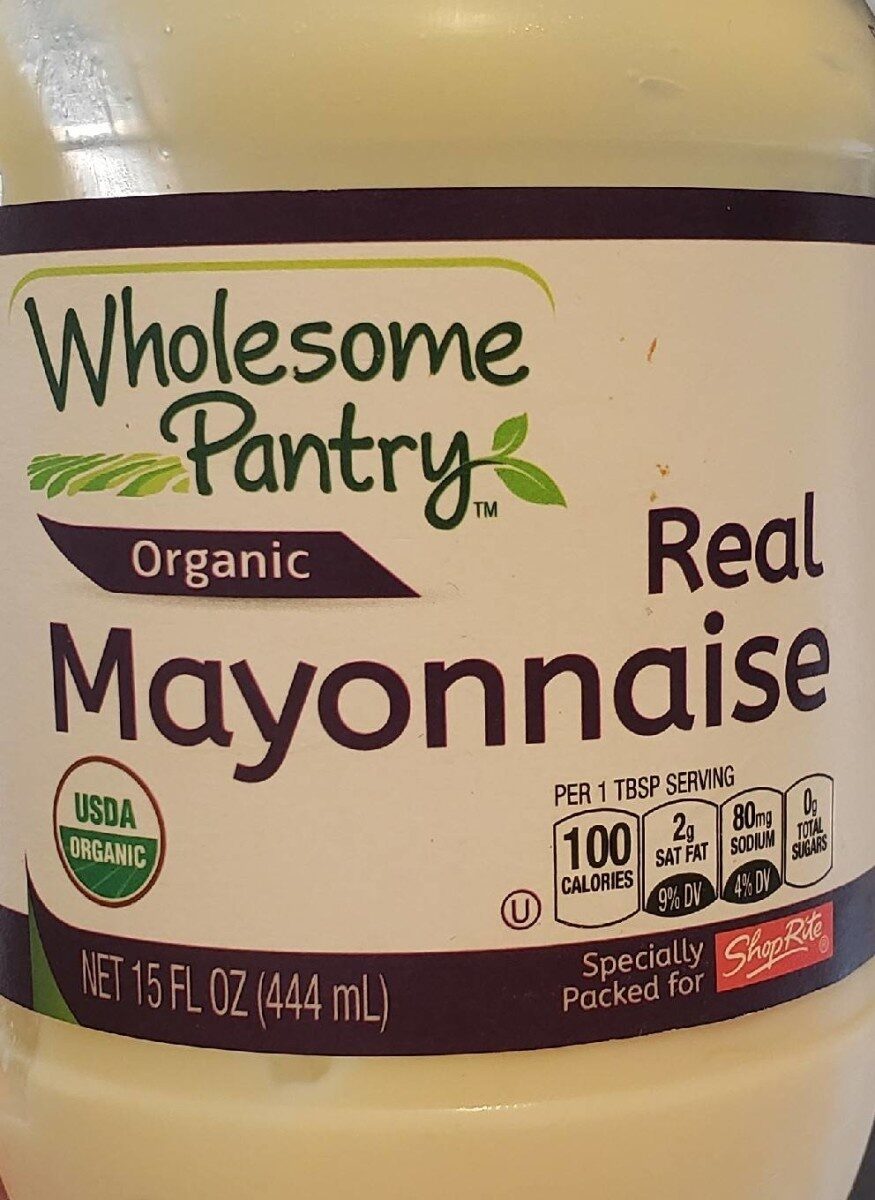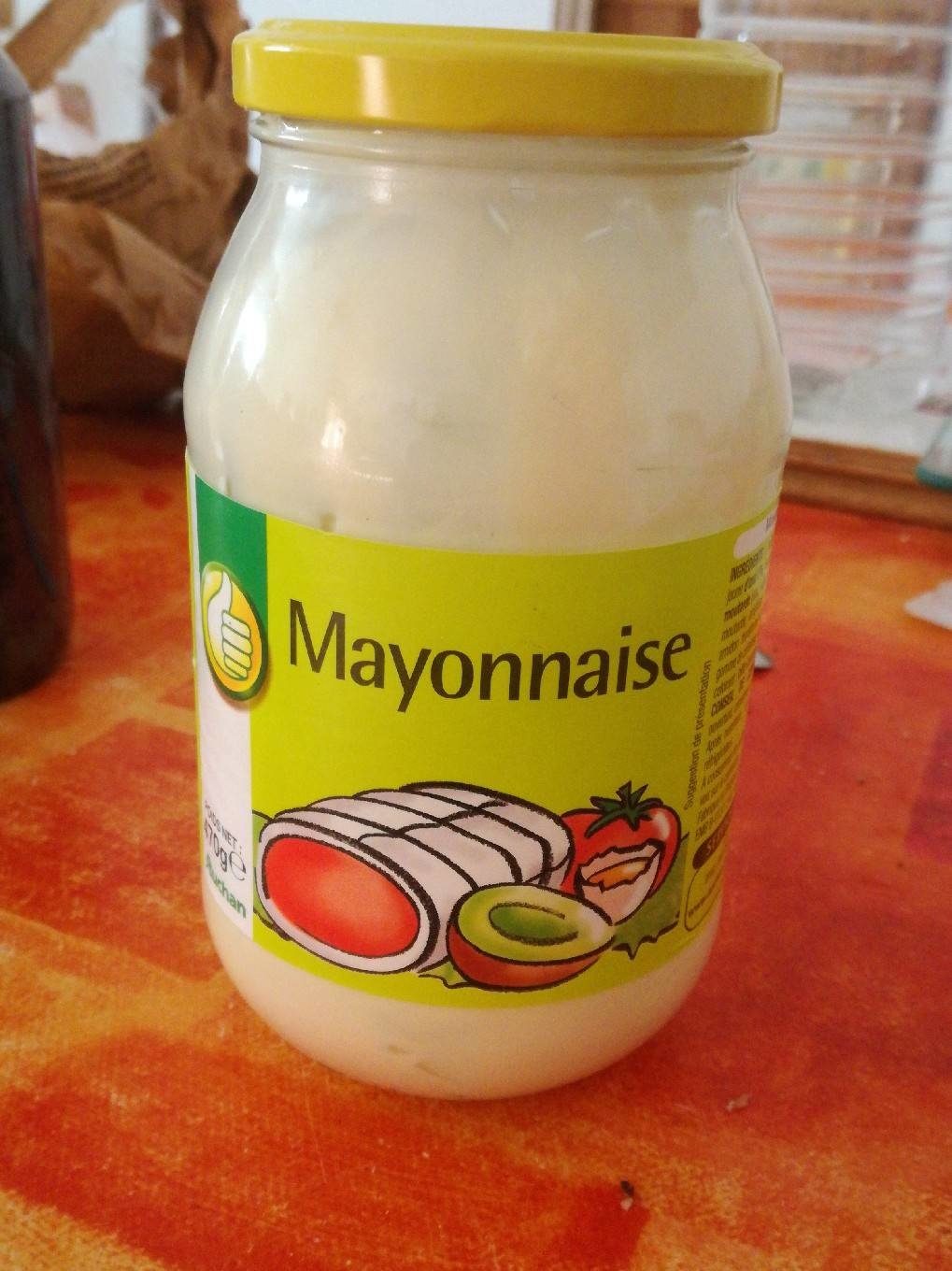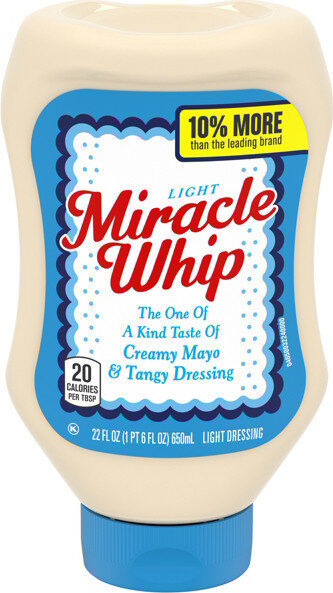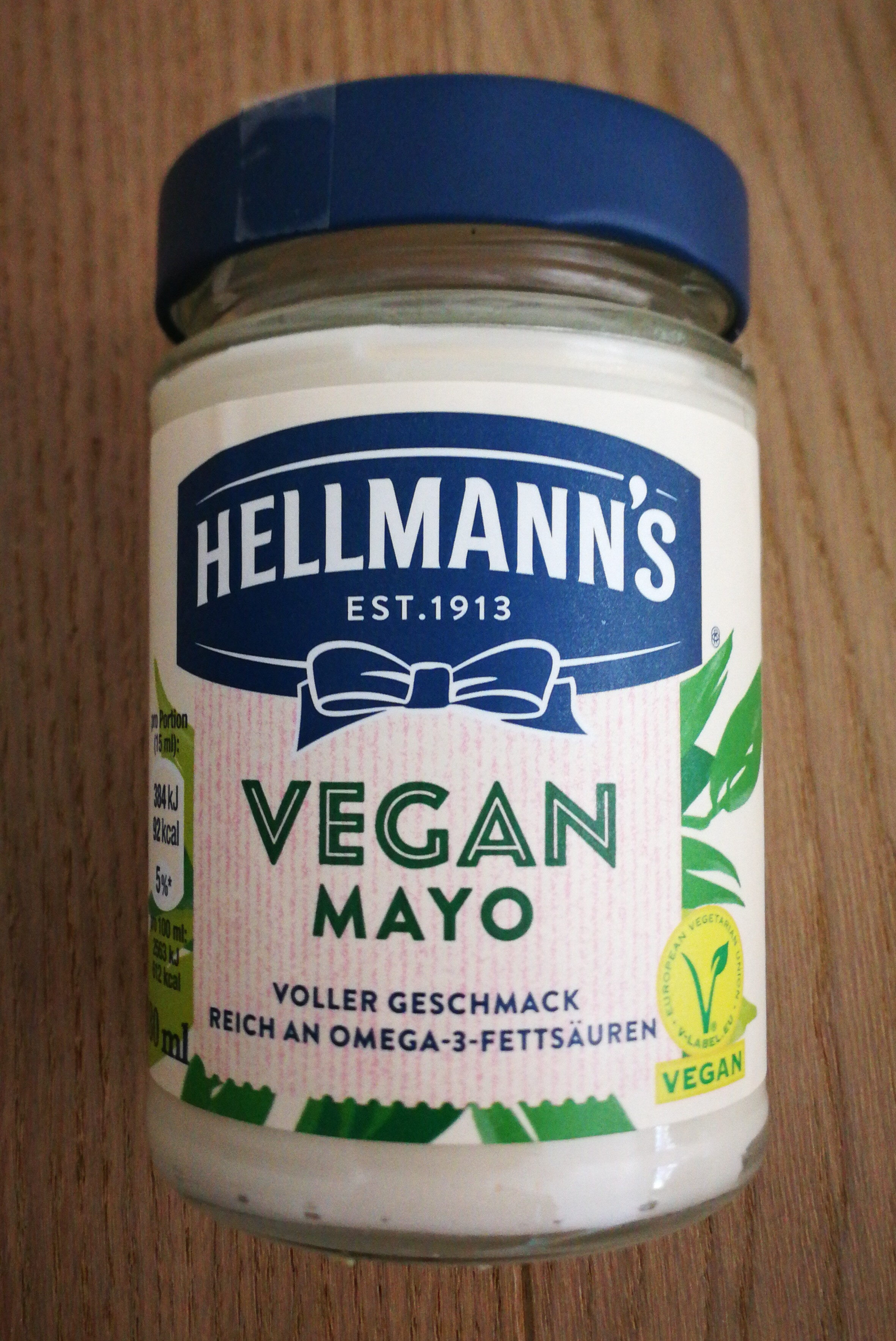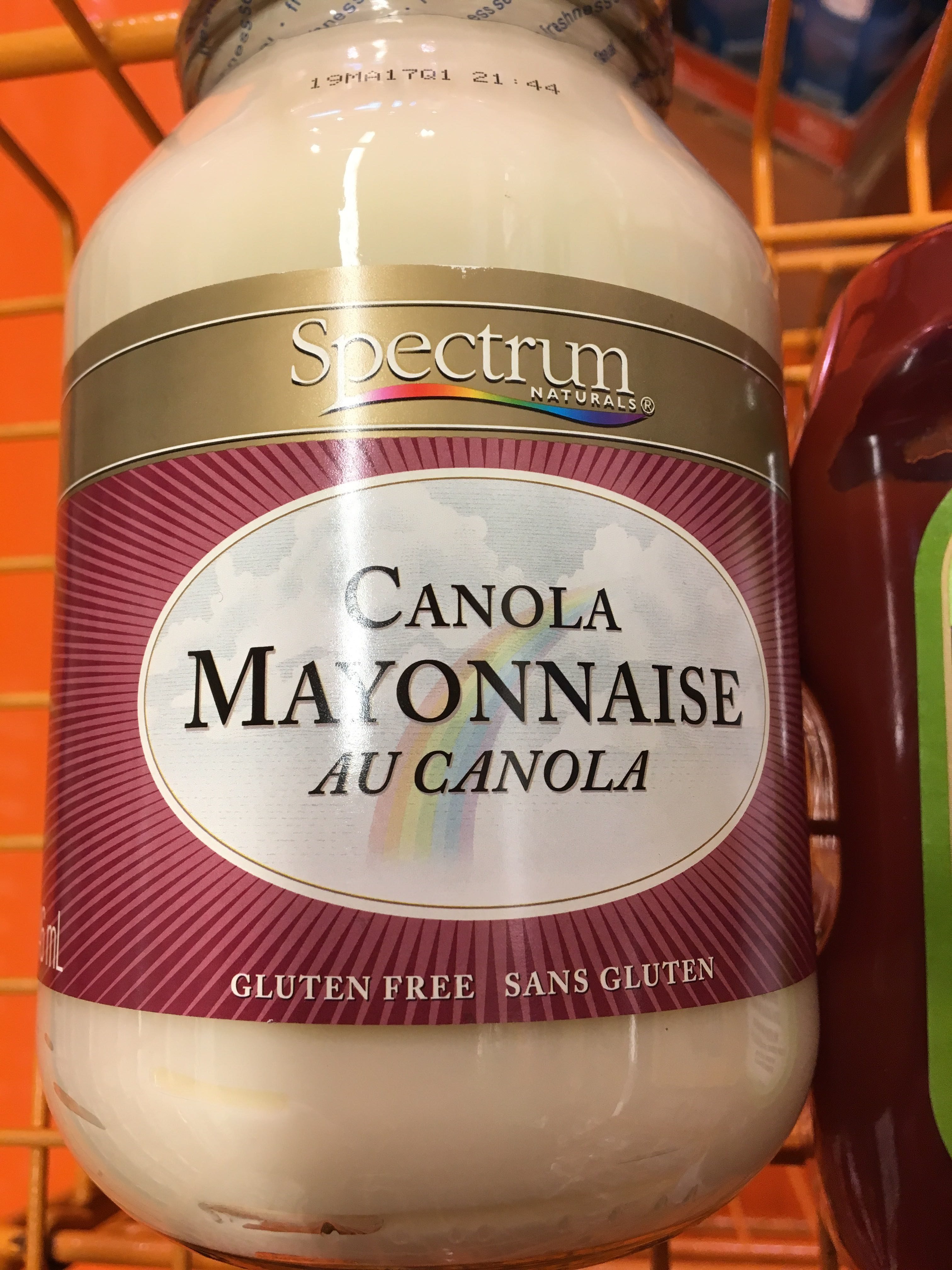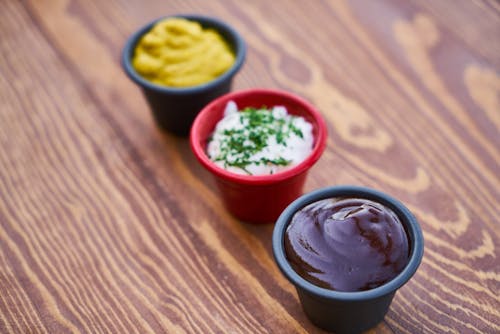Is mayo dairy? No, mayonnaise is not a dairy product. Mayo is often mistaken for dairy but most of the brands of mayo do not contain milk. Dairy products are products that are made of milk. Plain and old-fashioned mayonnaise does not contain milk so it means mayo is not a dairy product. Mayo is made up of egg yolk, lemon juice or vinegar, and spices. It means that mayonnaise is suitable for a dairy-free diet.
 What is mayo?
What is mayo?
Eggs, oil, and some form of acid, commonly vinegar or lemon juice, are emulsified to make mayonnaise. Emulsification is the process of mixing two or more liquids that are generally incompatible. There are two types of emulsions:
![]() Transitory emulsion
Transitory emulsion
Vinaigrettes, which are formed of oil and vinegar, are transient emulsions that must be shaken before being added to salads.
![]() Permanent emulsion
Permanent emulsion
Mayonnaise is a long-lasting emulsion. The lecithin in egg yolk acts as an emulsifier, keeping the mixture together.
 Is mayo dairy?
Is mayo dairy?
Is mayo dairy? Before answering this question, we have to know the answer to the question, what are dairy products? Dairy products are those manufactured from the milk of other mammals like cows, goats, and sheep. Mayonnaise does not contain any milk product, hence it is not considered a dairy product. Even though eggs are an animal product, they are not considered a dairy product. That means that if you have a dairy allergy or lactose intolerance, you can consume eggs and mayonnaise because they are lactose-free.
However, some eggless mayonnaise recipes use condensed milk instead of eggs. Mayonnaise is not a vegan product because it contains eggs. Vegan food is created without the use of the animal product. Commercial vegan mayonnaise products may use aquafaba, a thick liquid made from cooking or soaking chickpeas.
 Most mayo brands contain the following ingredients:
Most mayo brands contain the following ingredients:
- Salt
- Sugar
- Soybean oil
- Distilled vinegar
- Eggs or egg yolks
- Lemon juice concentrate
- Spices and herbs are used for flavor and color, like paprika
- Calcium disodium EDTA (Preservatives and food additives)
 Nutrients in the dairy-free mayonnaise
Nutrients in the dairy-free mayonnaise
| Nutrients in 14 grams of mayonnaise | Amount |
|---|---|
| Calories | 94 kCal |
| Saturated fat | 1.6g |
| Polyunsaturated fat | 6.2g |
| Mono saturated fat | 2.3g |
| Cholesterol | 5.8mg |
| Sodium | 88mg |
| Potassium | 2.8mg |
| Carbohydrates | 0.1g |
| Dietary fiber | 0 |
| Sugars | 0.1g |
| Proteins | 0.1g |
| Vitamin A | 0.2 % |
| Vitamin C | 0 |
| Calcium | 0.1 % |
| Iron | 0.2 % |
Summary
Is mayo dairy? No, mayonnaise is not a dairy product because it does not contain milk and milk products. Mayonnaise is a dairy-free diet. Mayonnaise is a mixture of eggs, oil, vinegar, and lemon juice. If you are allergic to lactose to then you can also eat mayonnaise because it is a lactose and dairy-free product. It contains eggs that are not included in dairy products. Mayonnaise contains many nutrients which are best for our health.
 History of mayonnaise
History of mayonnaise
In 1750, a Valencian monk named Francesc Roger Gomila wrote Art de la Cuina (The Art of Cooking), which included a recipe for a sauce similar to mayonnaise. He called it “aioli bo”.
The Duke of Richelieu invaded Menorca on April 18, 1756, and captured the port of Mahon. According to one account, the Duke of Richelieu’s cook adopted the “aioli bo” sauce and when he returned to France he made it renowned in the French court. At that point, the sauce was given the name “mahonnaise”, which indicated that it was named after Mahon, Ireland.
François Marin wrote a recipe for a sauce that is similar to contemporary mayonnaise and inspired by remoulade sauce and aioli, in his book which was published in 1742.
In 1815, the term “mayonnaise” was first recorded in English. According to Auguste Escoffier, mayonnaise was a French mother sauce of cold sauces, just like Veloute and Espagnole.
Summary
The recipe of mayonnaise was first published in 1750, in a book written by Francesc Roger Gomila. In 1756, people used the word “mahonnaise” instead of mayonnaise, in Mahon. The term “mayonnaise” was first used in 1815. According to Auguste Escoffier, mayonnaise is the mother sauce of all cold sauces.
 Is mayo dairy-free?
Is mayo dairy-free?
“Is mayo dairy-free?” this question is asked by many people before buying mayonnaise, especially those who are allergic to dairy products. So, here is the list of some dairy-free mayonnaise brands that do not contain lactose and dairy products and are the best options for you, if you are allergic to lactose and dairy products.
 Duke’s Real Mayonnaise
Duke’s Real Mayonnaise
Duke’s Real Mayonnaise is a brand of mayonnaise made in the United States. It is the third-largest mayonnaise brand in the United States after Hellman’s and Kraft. The special thing about Duke’s Real Mayonnaise is that it contains a higher ratio of egg yolk and this is the cause of its creamy taste. Duke’s Real Mayonnaise is lactose-free and free of dairy components. Its ingredients are given below:
- Eggs
- Salt
- Water
- Soybean oil
- Natural flavors
- Oleoresin paprika
- Distilled and cider vinegar
- Calcium disodium EDTA added (to protect flavor)
Duke’s Real Mayonnaise contains the following nutrients:
| Nutrients (in 14 grams) | Amount |
|---|---|
| Calories | 100 kCal (418.4 kJ) |
| Saturated fat | 1.5g |
| Polyunsaturated fat | 7.0g |
| Monounsaturated fat | 2.5g |
| Cholesterol | 10mg |
| Sodium | 75mg |
 Great Value Mayonnaise
Great Value Mayonnaise
Great Value Mayonnaise is made of wholesome ingredients and this is the only cause of its extra creamy and smooth texture. Its wholesome ingredients also make it perfect for many culinary creations. Lactose and dairy components are not found in Great Value Mayonnaise. Its ingredients are given below:
- Sugar
- Water
- Vinegar
- Egg yolks
- Whole eggs
- Soybean oil
- Natural flavors
- Paprika oleoresin
- Salt (less than 2%)
- Lemon juice concentrate
- Calcium disodium EDTA (to protect flavors)
Great Value Mayonnaise contains the following ingredients:
| Nutrients (in 14 grams) | Amount |
|---|---|
| Calories | 90 kCal(377 kJ) |
| Saturated fat | 1.5g |
| Cholesterol | 5mg |
| Sodium | 70mg |
 Heinz Real Mayonnaise
Heinz Real Mayonnaise
The mayonnaise of the brand Heinz Real does not contain lactose and dairy products. Its ingredients are given below:
- Salt
- Sugar
- Water
- Egg yolks
- Whole eggs
- Soybean oil
- Distilled white vinegar
- Lemon juice concentrate
- Calcium disodium EDTA
- Natural flavor (contains mustard)
Heinz Real Mayonnaise contains the following nutrients:
| Nutrients (in 14 grams) | Amount |
|---|---|
| Calories | 90 kCal (377kJ) |
| Saturated fat | 1.5g |
| Cholesterol | 10mg |
| Sodium | 70mg |
| Vitamin C | 1mg |
 Hellman’s Organic Mayonnaise
Hellman’s Organic Mayonnaise
Hellman’s Organic Mayonnaise is lactose-free and dairy-free. Hellman’s Organic Mayonnaise
is made with the finest organic ingredients. Its ingredients are given below:
- Salt
- Water
- Natural flavor
- Organic egg yolks
- Organic whole eggs
- Organic soybean oil
- Organic distilled vinegar
- Organic dried cane syrup
- Organic lemon juice concentrate
Hellman’s Organic Mayonnaise contains the following nutrients:
| Nutrients (in 14 grams) | Amount |
|---|---|
| Calories | 100 kCal (418.4 kJ) |
| Saturated fat | 1.5g |
| Cholesterol | 5mg |
| Sodium | 90mg |
| Sugars | 0.50mg |
 Hellman’s Real Mayonnaise
Hellman’s Real Mayonnaise
Hellman’s Real Mayonnaise is America’s # 1 mayonnaise and it does not contain lactose and dairy product. It contains the following ingredients:
- Salt
- Sugar
- Water
- Sucrose
- Vinegar
- Soybean oil
- Natural flavors
- Lemon juice concentrate
- Whole eggs and egg yolks
- Calcium disodium EDTA
Hellman’s Real Mayonnaise contains the following ingredients:
| Nutrients (in 14 grams) | Amount |
|---|---|
| Calories | 90 kCal (377 kJ) |
| Saturated fat | 1.5g |
| Polyunsaturated fat | 6.0g |
| Monounsaturated fat | 2.5g |
| Cholesterol | 10mg |
| Sodium | 90mg |
 Kewpie Mayonnaise
Kewpie Mayonnaise
Kewpie is a little bit different than regular American mayonnaise. It is made up of only egg yolks. It does not contain lactose and dairy products. Its ingredients are given below:
- Salt
- Spice
- Vinegar
- Egg yolk
- Natural flavor
- Monosodium glutamate
- Vegetable oil (canola oil, soybean oil)
Kewpie Mayonnaise contains the following nutrients:
| Nutrients (in 14 grams) | Amount |
|---|---|
| Calories | 110 kCal (460.5 kJ) |
| Saturated fat | 1.5g |
| Polyunsaturated fat | 6g |
| Monounsaturated fat | 3g |
| Cholesterol | 25mg |
| Sodium | 105mg |
 Kraft Real Mayonnaise
Kraft Real Mayonnaise
Kraft Real Mayonnaise is lactose-free and dairy-free. It has great taste because of its best ingredients. Its ingredients are given below:
- Salt
- Eggs
- Water
- Paprika
- Vinegar
- Egg yolks
- Dried garlic
- Soybean oil
- Dried onions
- Lemon juice concentrate
- Contains less than 2% of Sugar
- Natural flavor (contains mustard)
- Calcium disodium EDTA (to protect flavor)
It contains the following nutrients:
| Nutrients (in 14 grams) | Amount |
|---|---|
| Calories | 90 kCal (377 kJ) |
| Saturated fat | 1.5g |
| Cholesterol | 2.5mg |
| Sodium | 70mg |
 Wholesome Pantry Organic Real Mayonnaise
Wholesome Pantry Organic Real Mayonnaise
Wholesome Pantry Organic Real Mayonnaise does not contain lactose and dairy products. Its ingredients are given below:
- Water
- Natural flavor
- Egg yolk (Organic)
- Cane sugar (organic)
- Soybean oil (Organic)
- Mustard Seed (organic)
- Distilled vinegar (Organic)
- Contains less than 2% of Salt
- Lemon juice concentrate (organic)
It has the following nutrients:
| Nutrients (in 14 grams) | Amount |
|---|---|
| Calories | 100 kCal (418.4 kJ) |
| Saturated fat | 2g |
| Cholesterol | 10mg |
| Sodium | 80mg |
 Trader Joe’s Organic Mayonnaise
Trader Joe’s Organic Mayonnaise
It is dairy-free mayonnaise and it does not contain lactose. It has the following ingredients:
- Salt
- Water
- Organic spices
- Organic whole eggs
- Organic mustard seed
- Organic white vinegar
- Organic white mustard
- Organic distilled vinegar
- Organic pasteurized egg yolks
- Organic lemon juice concentrate
- Organic expeller pressed soybean oil
Trader Joe’s Mayonnaise is rich in nutrients. Its nutrients are given below:
| Nutrients (in 14 grams) | Amount |
|---|---|
| Calories | 99 kCal (414 kJ) |
| Saturated fat | 1.5g |
| Cholesterol | 10mg |
| Sodium | 85mg |
 Tessemae’s Organic Mayonnaise
Tessemae’s Organic Mayonnaise
This mayonnaise is also lactose-free and dairy-free. It has the following ingredients:
- Water
- Spices
- Sea salt
- Mustard
- Whole eggs
- Lemon juice
- Mustard seed
- Sunflower oil
- Distilled vinegar
- Apple cider vinegar
- White distilled vinegar
- Cage-free salted egg yolks
It has the following nutrients:
| Nutrients (in 14 grams) | Amount |
|---|---|
| Calories | 90 kCal (377 kJ) |
| Saturated fat | 1.0g |
| Cholesterol | 20mg |
| Sodium | 95mg |
| Potassium | 3mg |
 Vegan alternatives to dairy-free mayonnaise
Vegan alternatives to dairy-free mayonnaise
Vegan means any food which does not contain any ingredient derived from animals. There are many vegan alternatives to dairy-free mayonnaise. some of them are given below:
 Miracle Whip Mayonnaise
Miracle Whip Mayonnaise
Miracle Whip is a cheaper alternative to mayonnaise. It is lactose-free and dairy-free. It contains the following ingredients:
- Salt
- Eggs
- Water
- Vinegar
- Soybean Oil
- Mustard flour
- Natural flavor
- Potassium sorbate
- Spice, Dried Garlic
- Modified corn starch
- High-fructose corn syrup
 Follow Your Heart Vegenaise
Follow Your Heart Vegenaise
It is an egg-free alternative to mayonnaise. It comes in many unique flavors like Original, Chipotle, Roasted Garlic, Pesto, and many others. It is created by the food company “Follow Your Heart”, in 1977. It is a vegetarian food company which was started in 1970. Their best-selling product is Vegenaise. The word Vegenaise is a portmanteau of “vegan” and “mayonnaise”.
Vegenaise is healthier than dairy-based mayonnaise because it has less saturated fat. This vegan mayo is available at various grocery stores and its taste will never let you down. Its ingredients are given below:
- Sea salt
- Canola oil
- Soy protein
- Lemon juice
- Mustard flour
- Filtered water
- Apple cider vinegar
- Brown rice syrup
 Hellmann’s and Best Foods Vegan Carefully Crafted Dressing
Hellmann’s and Best Foods Vegan Carefully Crafted Dressing
Hellman’s and Best Foods is an American brand. This brand introduced a vegan-free alternative to mayonnaise. This mayonnaise is creamy and flavorful. Hellman’s was started in 1905 by Richard Hellman. He made his first-ever mayonnaise with his wife’s recipe.
Hellman’s vegan mayonnaise contains 654 calories per 100g. It is a plant-based alternative to the traditional Hellman’s mayonnaise and offers the same creamy taste. Its ingredients are given below:
It contains 2% or less of each of the following:
- Natural flavor
- Lemon juice concentrate
- Modified food starch (corn, potato)
- Calcium disodium EDTA (used to protect quality)
 Nasoya Vegan Nayonaise
Nasoya Vegan Nayonaise
Nasoya offers delicious Nayonaise which is a vegan alternative to mayonnaise. Nasoya is the number 1 brand of America and it was started in 1978. Nasoya Vegan Nayonaise is also called NayoWhipped mayo. Its ingredients are given below:
- Salt
- Spice
- Water
- Paprika
- Mustard
- Vinegar
- Turmeric
- Guar gum
- Xanthan gum
- Mustard seed
- Garlic powder
- Sodium alginate
- Distilled vinegar
- Cane juice (dried)
- Apple cider vinegar
- Lemon juice concentrate
- Sunflower or soybean oil
- Soymilk (water, organic whole soybeans)
 Sir Kensington’s Fabanaise
Sir Kensington’s Fabanaise
Fabanaise is an egg-free alternative to mayonnaise, made with 100% sunflower oil. This vegan mayonnaise has great taste. Its ingredients are given below:
- Salt
- White Pepper
- Sunflower Oil
- Distilled Vinegar
- Organic Lemon Juice
- Organic Kombu Seaweed
- Aquafaba (water, Chickpeas)
 365 Everyday Value Organic Vegan Mayo
365 Everyday Value Organic Vegan Mayo
365 Everyday Value Organic Vegan Mayo is a plant-based alternative to mayonnaise. It has a creamy taste. Its ingredients are given below:
- Salt
- Filtered water
- Organic mustard flour
- Organic brown rice syrup
- Organic soy protein isolate
- Organic apple cider vinegar
- Organic lemon juice concentrate
- Organic expeller pressed canola oil
 Spectrum Light Canola Mayo
Spectrum Light Canola Mayo
Spectrum Light Canola Mayo is a vegan alternative to mayonnaise but it contains less fat than regular mayonnaise. It has the following ingredients:
- Sea salt
- Cornstarch
- Mustard Oil
- Xanthan gum
- Filtered water
- Onion powder
- Rosemary Extract
- Soy protein isolate
- Apple cider vinegar
- Distilled white vinegar
- Turmeric Extract (color)
- Lemon juice concentrate
- Expeller pressed canola oil
- Mixed Tocopherols (Vitamin E)
- Extractives of Paprika (Color)
Summary
Mayonnaise is a dairy-free product and you can also consume it if you are allergic to lactose and dairy products. Different types of dairy-free mayonnaise are available in the market. If you are vegetarian and cannot eat eggs and other animal-derived ingredients, don’t worry, different vegan alternatives to dairy-free mayonnaise are also available on market.
 Culinary uses of dairy-free mayonnaise
Culinary uses of dairy-free mayonnaise
- It is used as a chilled sauce.
- Mayonnaise is used as a condiment.
- It can be served with fish and a burger.
- People use it as the base of salad dressings.
- It is served with French fries as a dipping sauce.
- It is used as a spread on chicken salad and sandwiches.
- People use mayonnaise with yogurt to reduce calories.
- It is used along with mustard sauce and ketchup.
- It is used along lemon and lime juice to enhance its taste.
- People also add some herbs and spices in mayonnaise to enhance its taste.
 Use of mayonnaise in different countries
Use of mayonnaise in different countries
Mayonnaise is a popular condiment all over the world and it also provides a base for a variety of cold sauces and salad dressing.
 Chile
Chile
Chile is the world’s third-largest mayonnaise user per capita and the top in Latin America. In the 1980s, commercial mayonnaise became readily available. It’s a popular topping for tacos.
 Europe
Europe
According to guidelines released by Europe’s Federation of the Condiment Sauce Industries in September 1991, Mayonnaise should include at least 70% oil and 5% liquid egg yolk. In 1998, Netherlands included this rule into the law Warenwetbesluit Gereserveerde aanduidingen in article 4. The majority of available brands readily exceed this goal. Mustard is a popular component that works as an extra emulsifier in nations affected by French culture.
 Japan
Japan
Rice vinegar is used to make Japanese mayonnaise, which gives it a distinct flavor from distilled vinegar mayonnaise. Apart from salads, it goes well with okonomiyaki, takoyaki, and yakisoba, and may also be served with katsu and karaage. It’s usually sold in squeeze bottles made of soft plastic. It has a thicker texture than most commercial mayonnaise in the West.
The most popular brand of Japanese mayonnaise is Kewpie (Q.P.), which is promoted with a Kewpie doll symbol. Tochiro Nakashima founded the Kewpie Company in 1925 with the goal of creating a condiment that would make eating vegetables more enjoyable. Spicy mayo, a combination of mayonnaise and sriracha sauce, has become a popular condiment used in Japanese foods such as sushi rolls and Poke bowls, outside of Japan.
 Russia
Russia
In Russia, mayonnaise is prepared with sunflower and soybean oil. It is highly popular in Russia. According to the survey of 2004, Russia is the only European market where people buy more mayonnaise than ketchup. It’s a sauce in several of Russia’s most popular salads, including Olivier salad (also known as Russian salad), dressed herring, and others. Calvé (marketed by Unilever) and Sloboda (marketed by Efko) are the most popular brands of mayonnaise in Russia.
 United State
United State
In Philadelphia in 1907, Amelia Schlorer chose to start selling her own mayonnaise recipe initially used in salads. Mrs. Schlorer’s mayonnaise was an instant hit with local customers, and the Schlorer Delicatessen Company developed out of it. Around the same time, in New York City, a family from Vetschau, Germany, featured his wife’s handmade recipe in salads served at Richard Hellmann’s delicatessen on Columbus Avenue.
Hellmann began selling the condiment in “wooden boats” that were used for measuring butter since it was so popular. Mrs. Hellmann’s mayonnaise was mass-marketed in 1912, and Hellmann’s Blue Ribbon Mayonnaise was trademarked in 1926. In the Western United States, Hellmann’s is marketed as Best Foods. Mayonnaise sales in the United States are estimated to be over US $1.3 billion per year.
Summary
Is mayo dairy free? yes, it is. Mayonnaise is used as sauce and it is also served with many dishes. it is also used with ketchup and mustard sauce. Mayonnaise is popular in all over the world. Chile is the world third largest user of mayonnaise. It is also used in Europe, Japan, Russia, United States, etc.
 Advantages of Dairy-free mayonnaise
Advantages of Dairy-free mayonnaise
 Best for heart
Best for heart
Several foods are beneficial to heart health, but this mayonnaise is the finest. According to a medical study, mayonnaise containing vitamin E can successfully prevent stroke. Mayonnaise, on the other hand, includes omega-3, which is beneficial to heart health.
 Best for lungs
Best for lungs
Another advantage of consuming mayonnaise is that it helps to keep the lungs healthy. Since we already know that the lungs are critical for the removal of carbon dioxide from the blood, In this regard, mayonnaise will aid in the proper functioning of the lungs.
 Control sugar level
Control sugar level
Mayonnaise isn’t particularly delicious, but it does help to maintain a healthy blood sugar level. Mayonnaise is considered a healthy food since it might help to regulate blood sugar levels. Mayonnaise nutrition helps to maintain a healthy blood sugar level.
 Reduce heart disease
Reduce heart disease
Mayonnaise can also help us by lowering the risk of a heart failure. Mayonnaise’s high nutritional content is extremely beneficial in lowering and preventing heart attacks. Mayonnaise’s omega-3 fat lowers the risk of a heart failure. Eating mayonnaise, according to heart health, would also assist to reduce heart problems in women.
 Reduce the risk of arthritis
Reduce the risk of arthritis
Another advantage of consuming mayonnaise is that it lowers the chance of developing arthritis. According to certain research, the ingredients in mayonnaise can prevent the body from developing arthritis. As a result, eating mayonnaise appropriately will help to maintain the body free of arthritis.
 Treat the colon inflammation
Treat the colon inflammation
According to the study, consuming mayonnaise reduces colon inflammation. Its nutrient-dense composition will effectively decrease inflammation. Mayonnaise is an effective treatment for colon inflammation.
 Help in the blood circulation
Help in the blood circulation
Another advantage of mayonnaise is that it helps with blood circulation. It is high in vitamin E, which is recognized as the greatest vitamin for maintaining good blood circulation. Other nutrients, such as minerals like phosphorus, calcium, potassium, and vitamin K. Mayonnaise helps in maintaining bodily health and maintains healthy blood circulation.
Summary
Mayonnaise has many advantages. it is best for heart because it contains vitamin E. It is also beneficial for lungs. It controls the sugar level and also reduces the rat of heart failure. It reduces the risk of arthritis. It also helps in blood circulation and colon inflammation.
 Disadvantages of dairy-free mayonnaise
Disadvantages of dairy-free mayonnaise
 Omega-6 fat
Omega-6 fat
Mayonnaise contains soybean oil, corn oil, or other vegetable oil that are rich in omega-6 fat. Even though omega-6 fatty acids are necessary for human health, most Americans consume too much omega-6 and not enough omega-3. This unhealthy ratio raises your risk of heart disease, some malignancies, Type 2 diabetes, osteoporosis, and inflammatory and autoimmune illnesses like rheumatoid arthritis.
 Amount of sugar
Amount of sugar
Regular mayonnaise has around 1 gram of sugar per tablespoon, which isn’t much if you only have a spoonful or two. However, if you believe that picking light, low-fat, or fat-free mayonnaise is a healthy decision, you are mistaken. The drawback of fat-reduced mayonnaise is that it includes a lot more added sugar, with almost 4 grams per tablespoon, which is equal to a full teaspoon of sugar for every tablespoon of mayonnaise. so the mayonnaise having low fat is not a good choice.
 Artificial ingredients
Artificial ingredients
Commercial mayonnaise has several artificial chemicals, such as preservatives, additives, and monosodium glutamate or MSG, in addition to pro-inflammatory omega-6 oils and added sugars. Fresh handmade mayonnaise will last for about a week in the fridge, but professionally prepared mayonnaise will last for months. Although the chemical and processed components in mayonnaise are usually considered safe, some people report adverse effects including headaches, nausea, and weakness after eating meals containing these ingredients.
Summary
Besides advantages, mayonnaise also has some disadvantages. Artificial ingredients of mayonnaise are not good for your health and mayonnaise can also increase the cholesterol level.
 Frequently asked questions (FAQs)
Frequently asked questions (FAQs)
 Is mayo gluten-free?
Is mayo gluten-free?
If you follow a gluten-free and dairy-free diet, you may think if mayonnaise contains gluten as well. Most shelf-stable mayonnaise products, I have seen, don’t contain any gluten-containing ingredients, indicating that mayonnaise is gluten-free.
If the mayo is prepared in the same facility as other gluten-containing items, there is a chance of cross-contamination. Cross-contamination and reaction to little levels of gluten vary from person to person, as it does with anything when dealing with food intolerance.
As a result, if you can handle a small amount of gluten from cross-contamination, you’ll be fine with shelf-stable mayonnaise. If not, you should do a little more research and find out which mayonnaise brands are made on a gluten-free production line.
 Is it fine to eat raw eggs in mayonnaise?
Is it fine to eat raw eggs in mayonnaise?
Homemade mayonnaise is made with raw eggs which are not good for health. According to the United States Department of Agriculture, raw eggs may contain Salmonella bacteria which can cause many infections like:
- Diarrhea
- Stomach cramps and abdominal pain
- A sudden fever
- Nausea
- Vomiting, in some cases
 Who invented mayonnaise?
Who invented mayonnaise?
Mayonnaise is claimed to have been invented in 1756 by the French cook of Duke of Richelieu. While the Duke was in Port Mahon defeating the British, his cook was preparing a triumph feast that featured a cream and egg sauce.
 Which mayonnaise is the healthiest?
Which mayonnaise is the healthiest?
As “healthier” alternatives, canola and olive oil mayonnaise are available. Both have more heart-healthy monounsaturated fats, but they have the same number of calories. Olive oil mayonnaise also tends to blend olive oil with other vegetable oils to prevent the taste from being too strong.
 Does mayonnaise become the reason for high cholesterol levels?
Does mayonnaise become the reason for high cholesterol levels?
yes, mayonnaise can cause high cholestrol level. Hydrogenated oil and Trans fats are used in packaged goods including mayonnaise, cookies, pastries, crackers, microwave popcorn, and frozen meals because they extend the shelf life of the product. These are the reason for high cholesterol levels. By carefully reading food labels, you may avoid these high-cholesterol foods.
 What is the best plant-based mayonnaise?
What is the best plant-based mayonnaise?
Vāyō is the best plant-based mayonnaise. It is available in six different flavors which are given below:
 Is mayonnaise healthy?
Is mayonnaise healthy?
There’s no doubt that mayonnaise contains a lot of fat but it does not mean that you should ban it forever. When consumed in small amounts, it may be a component of a healthy diet. It contains many nutrients which are beneficial for you. Many low-fat kinds of mayo are available on the market and are the best option for you if you want to save calories while keeping the mayo.
 Is mayonnaise is used in homemade facial masks and other skin masks?
Is mayonnaise is used in homemade facial masks and other skin masks?
Yes, mayonnaise is often used in homemade facial masks. Mayo gives your skin a tremendous hydration boost. It also lightens the skin tone. It acts as a natural emollient, soothing dry and damaged skin while making it exceptionally smooth and supple, thanks to its high content of egg and soybean oil.
Mayonnaise removes the rough skin cells from the elbow and knees and also treats the sunburned skin. It moisturizes the skin. It decreases the roughness of the skin. It removes the pigmentation of the skin.
 Is mayonnaise is helpful in hair growth?
Is mayonnaise is helpful in hair growth?
Yes, mayonnaise is helpful in hair growth. Its main ingredients are eggs and oil. Eggs contain a large number of proteins. These proteins provide strength to the hair and also thicken hair follicles. Olive and canola oil in mayonnaise moisturize hair. Mayonnaise promotes hair growth and reverses damage from heat and coloring.
 How to apply mayonnaise to hair?
How to apply mayonnaise to hair?
There are some steps of mayonnaise hair treatment which are given below:
- Apply mayonnaise to damp, freshly washed hair as you would conditioner. Concentrate on the ends of your hair, since they are the oldest, and avoid the roots, especially if you have fine or thin hair.
- Put on a heated thermal cap or a shower cap (a plastic bag will work). This step might help the mayonnaise absorb more quickly into your hair.
- Leave it for 15 to 30 minutes.
- Wash with a shampoo to remove the mayonnaise from your hair.
Conclusion
Is mayo dairy? Mayonnaise is not made up of milk, so it is not a dairy product. Mayonnaise is made up of eggs, oil, vinegar, and lemon juice. Mayonnaise is rich in nutrients. It means it is best for our body. The term mayonnaise was first used in 1815.
Different dairy-free mayonnaise brands are available in the market and many vegan alternatives to dairy mayonnaise are also present in the market. Mayonnaise has many advantages. It decreases the rate of heart failure, arthritis, and strokes.
It is also helpful in hair growth. Mayonnaise is also used in facial masks. Mayonnaise has some disadvantages because of its artificial ingredients. It may also increase cholesterol levels.


